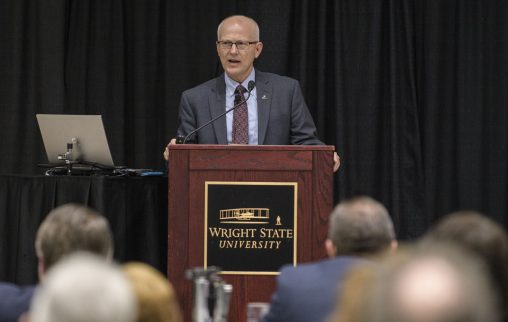
Jeff Ulliman, vice president for business and finance and chief financial officer, presented Wright State’s fiscal year 2017 budget in the Student Union Apollo Room on June 2. (Photo by Erin Pence)
Wright State will proactively and responsibly address ongoing fiscal challenges, university officials said as they presented the university’s proposed fiscal year 2017 budget to the Board of Trustees as well as faculty, staff and students.
Jeff Ulliman, vice president for business and finance and chief financial officer, detailed the university’s financial condition and laid out the proposed budget to the trustees and the campus audience in the Student Union Apollo Room on June 2.
Much of his presentation focused on a plan to address the university’s budget challenge.
Wright State is facing a $27.7 million operating budget shortfall, in part due to unplanned expenses and a decline in revenue, primarily from lower investment returns.
To address the budget challenge, Wright State plans to strategically cut spending in 2016-2017 by $12.1 million and use $15.6 million in university reserves.
As part of the budget shortfall, the university will also seek to save up to $8 million in personnel costs over the next two years through attrition, retirements and eliminating duplication in areas where possible.
Wright State President David R. Hopkins said the university will work closely with employees who are displaced to seek other opportunities on campus when possible.
“As we rebalance this budget, we will make every effort to have the least minimal impact we can on people,” Hopkins said.
Wright State officials said the university will continue to provide students with an accessible and affordable education.
“We’re very frugal in terms of keeping our tuition low. We’re well below the national average. We’re one of the lowest in the state. And yet it’s hard. We serve so many needy students,” Hopkins said, adding, “We’re still going to make sure we serve students as our top priority.”
“The budget this next year will be a challenge because we’re in the process of getting the budget better aligned with the revenue and the expenses. Our goal is to reduce the impact on the education to our students and continue to offer an excellent educational experience to a diverse student population,” said Michael Bridges, chair of the Board of Trustees.
Hopkins said the university must continue with its entrepreneurial spirit and make Wright State the best university for the world.
“We have not stood still over the last decade, and we cannot stand still now. The world is changing, the funding mechanisms are changing,” he said.
The university proposed an annual operating budget of $333.8 million, an increase of $22.8 million over last year’s proposed budget, for the new fiscal year, which begins July 1. It is part of an overall budget of $418 million — which includes money for restricted use that comes from research grants and contracts.
For the second consecutive year, Wright State will not increase tuition for all full-time resident undergraduate students. Boonshoft School of Medicine students will also not see an increase in tuition.
As part of the budget, the university requested a tuition increase this fall for graduate, professional and non-resident students of 3 percent.
Wright State’s tuition continues to track below the U.S. national average for four-year public universities and is among the lowest for Ohio’s four-year public universities.
The creation of the annual budget and the plan to address the university’s financial challenges has involved not only the Office of Budget Planning and Resource Analysis and other administrative offices, but also the president, provost, vice presidents, deans, faculty and staff.
“I am proud of the way university leadership and the university community has engaged and responded with conviction in the desire to address and overcome these challenges,” Ulliman said.
Closely following the budget plan will ensure the university addresses its budget challenge, he said.
“Fortunately we have a university full of committed individuals who are passionate about Wright State,” he said. “We just need to stay focused and remember the greater goal of improving our financial status so that we can better serve our students.”
Wright State trustees voted to approve the fiscal year 2017 budget at the conclusion of the June 2 meeting.

 Wright State’s Homecoming Week features block party-inspired events Feb. 4–7 on the Dayton Campus
Wright State’s Homecoming Week features block party-inspired events Feb. 4–7 on the Dayton Campus  Wright State music professor honored with Ohio’s top music education service award
Wright State music professor honored with Ohio’s top music education service award  Wright State’s Industrial and Human Factors Engineering program named one of top online graduate programs by U.S. News
Wright State’s Industrial and Human Factors Engineering program named one of top online graduate programs by U.S. News  Student-run ReyRey Café celebrates decade of entrepreneurship at Wright State
Student-run ReyRey Café celebrates decade of entrepreneurship at Wright State  Wright State faculty member Damaris Serrano wins Panamanian literary award
Wright State faculty member Damaris Serrano wins Panamanian literary award 